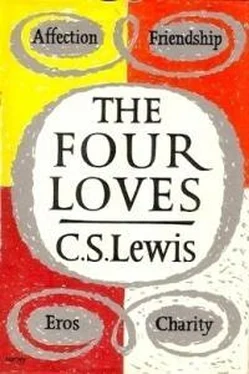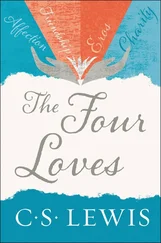Sexuality may operate without Eros or as part of Eros. Let me hasten to add that I make the distinction simply in order to limit our inquiry and without any moral implications. I am not at all subscribing to the popular idea that it is the absence or presence of Eros which makes the sexual act "impure" or "pure", degraded or fine, unlawful or lawful. If all who lay together without being in the state of Eros were abominable, we all come of tainted stock. The times and places in which marriage depends on Eros are in a small minority. Most of our ancestors were married off in early youth to partners chosen by their parents on grounds that had nothing to do with Eros. They went to the act with no other "fuel", so to speak, than plain animal desire. And they did right; honest Christian husbands and wives, obeying their fathers and mothers, discharging to one another their "marriage debt", and bringing up families in the fear of the Lord. Conversely, this act, done under the influence of a soaring and iridescent Eros which reduces the role of the senses to a minor consideration, may yet be plain adultery, may involve breaking a wife's heart, deceiving a husband, betraying a friend, polluting hospitality and deserting your children. It has not pleased God that the distinction between a sin and a duty should turn on fine feelings. This act, like any other, is justified (or not) by far more prosaic and definable criteria; by the keeping or breaking of promises, by justice or injustice, by charity or selfishness, by obedience or disobedience. My treatment rules out mere sexuality—sexuality without Eros—on grounds that have nothing to do with morals; because it is irrelevant to our purpose.
To the evolutionist Eros (the human variation) will be something that grows out of Venus, a late complication and development of the immemorial biological impulse. We must not assume, however, that this is necessarily what happens within the consciousness of the individual. There may be those who have first felt mere sexual appetite for a woman and then gone on at a later stage to "fall in love with her". But I doubt if this is at all common. Very often what comes first is simply a delighted pre–occupation with the Beloved—a general, unspecified pre–occupation with her in her totality. A man in this state really hasn't leisure to think of sex. He is too busy thinking of a person. The fact that she is a woman is far less important than the fact that she is herself. He is full of desire, but the desire may not be sexually toned. If you asked him what he wanted, the true reply would often be, "To go on thinking of her." He is love's contemplative. And when at a later stage the explicitly sexual element awakes, he will not feel (unless scientific theories are influencing him) that this had all along been the root of the whole matter. He is more likely to feel that the incoming tide of Eros, having demolished many sand–castles and made islands of many rocks, has now at last with a triumphant seventh wave flooded this part of his nature also—the little pool of ordinary sexuality which was there on his beach before the tide came in. Eros enters him like an invader, taking over and reorganising, one by one, the institutions of a conquered country. It may have taken over many others before it reaches the sex in him; and it will reorganise that too.
No one has indicated the nature of that reorganisation more briefly and accurately than George Orwell, who disliked it and preferred sexuality in its native condition, uncontaminated by Eros. In Nineteen–Eighty–Four his dreadful hero (how much less human than the four–footed heroes of his excellent Animal Farm !), before towsing the heroine, demands a reassurance, "You like doing this?", he asks, "I don't mean simply me; I mean the thing in itself." He is not satisfied till he gets the answer, "I adore it." This little dialogue defines the reorganisation. Sexual desire, without Eros, wants it , the thing in itself ; Eros wants the Beloved.
The thing is a sensory pleasure; that is, an event occurring within one's own body. We use a most unfortunate idiom when we say, of a lustful man prowling the streets, that he "wants a woman". Strictly speaking, a woman is just what he does not want. He wants a pleasure for which a woman happens to be the necessary piece of apparatus. How much he cares about the woman as such may be gauged by his attitude to her five minutes after fruition (one does not keep the carton after one has smoked the cigarettes). Now Eros makes a man really want, not a woman, but one particular woman. In some mysterious but quite indisputable fashion the lover desires the Beloved herself, not the pleasure she can give. No lover in the world ever sought the embraces of the woman he loved as the result of a calculation, however unconscious, that they would be more pleasurable than those of any other woman. If he raised the question he would, no doubt, expect that this would be so. But to raise it would be to step outside the world of Eros altogether. The only man I know of who ever did raise it was Lucretius, and he was certainly not in love when he did. It is interesting to note his answer. That austere voluptuary gave it as his opinion that love actually impairs sexual pleasure. The emotion was a distraction. It spoiled the cool and critical receptivity of his palate. (A great poet; but "Lord, what beastly fellows these Romans were!")
The reader will notice that Eros thus wonderfully transforms what is par excellence a Need–pleasure into the most Appreciative of all pleasures. It is the nature of a Need–pleasure to show us the object solely in relation to our need, even our momentary need. But in Eros, a Need, at its most intense, sees the object most intensely as a thing admirable in herself, important far beyond her relation to the lover's need.
If we had not all experienced this, if we were mere logicians, we might boggle at the conception of desiring a human being, as distinct from desiring any pleasure, comfort, or service that human being can give. And it is certainly hard to explain. Lovers themselves are trying to express part of it (not much) when they say they would like to "eat" one another. Milton has expressed more when he fancies angelic creatures with bodies made of light who can achieve total interpenetration instead of our mere embraces. Charles Williams has said something of it in the words, "Love you? I am you."
Without Eros sexual desire, like every other desire, is a fact about ourselves. Within Eros it is rather about the Beloved. It becomes almost a mode of perception, entirely a mode of expression. It feels objective; something outside us, in the real world. That is why Eros, though the king of pleasures, always (at his height) has the air of regarding pleasure as a by–product. To think about it would plunge us back in ourselves, in our own nervous system. It would kill Eros, as you can "kill" the finest mountain prospect by locating it all in your own retina and optic nerves. Anyway, whose pleasure? For one of the first things Eros does is to obliterate the distinction between giving and receiving.
Hitherto I have been trying merely to describe, not to evaluate. But certain moral questions now inevitably arise, and I must not conceal my own view of them. It is submitted rather than asserted, and of course open to correction by better men, better lovers and better Christians.
It has been widely held in the past, and is perhaps held by many unsophisticated people to–day, that the spiritual danger of Eros arises almost entirely from the carnal element within it; that Eros is "noblest" or "purest" when Venus is reduced to the minimum. The older moral theologians certainly seem to have thought that the danger we chiefly had to guard against in marriage was that of a soul–destroying surrender to the senses. It will be noticed, however, that this is not the Scriptural approach. St. Paul, dissuading his converts from marriage, says nothing about that side of the matter except to discourage prolonged abstinence from Venus ( I Cor. VII, 5). What he fears is pre–occupation, the need of constantly "pleasing"—that is, considering—one's partner, the multiple distractions of domesticity. It is marriage itself, not the marriage bed, that will be likely to hinder us from waiting uninterruptedly on God. And surely St. Paul is right? If I may trust my own experience, it is (within marriage as without) the practical and prudential cares of this world, and even the smallest and most prosaic of those cares, that are the great distraction. The gnat–like cloud of petty anxieties and decisions about the conduct of the next hour have interfered with my prayers more often than any passion or appetite whatever. The great, permanent temptation of marriage is not to sensuality but (quite bluntly) to avarice. With all proper respect to the medieval guides, I cannot help remembering that they were all celibates, and probably did not know what Eros does to our sexuality; how, far from aggravating, he reduces the nagging and addictive character of mere appetite. And that not simply by satisfying it. Eros, without diminishing desire, makes abstinence easier. He tends, no doubt, to a pre–occupation with the Beloved which can indeed be an obstacle to the spiritual life; but not chiefly a sensual pre–occupation.
Читать дальше











